Audiences have often praised Rick and Morty due to its wild comedy and mind-blowing science fiction storytelling. However, fans have also noticed the undercurrent of dark and introspective themes that lie beneath Rick and Morty's comedic presentation, which bring forth the show's profound philosophical dimensions. Some specific installments in Rick and Morty choose to move away from comedy to showcase topics about mental diseases, identity struggles, social collapse, and psychological distress.
The show's bleak stories address existential concerns, psychological horrors, and the terrible reality of human society. The shows continue to feature strange inventions during their multiverse excursions, but these episodes simultaneously reveal their characters at their most vulnerable, agonizing states. Each of them has a sore spot: Morty loses his childlike innocence, and Beth has unsettling emotional revelations that go beyond typical animated entertainment, while Rick struggles with crippling despair.
A list of seven gloomy episodes from Rick and Morty is provided here to demonstrate how wild comedy often reflects serious issues are often too distressing to be dealt with directly.
Please note: This article is based on the writer's opinion. Reader discretion is advised.
The list of 7 Rick and Morty dark episodes is provided below:
(7) Meeseeks and Destroy (S1, Ep5)
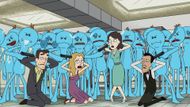
Directed by Bryan Newton and written by Ryan Ridley, this episode is rated TV-14-DLSV and follows Morty conducting a reportedly safer expedition since he has had enough of Rick's pranks. Jerry conjures weird animals to help him with his golf skills.
This episode features a mystery contraption known as the Meeseeks Box. The box allows Mr. Meeseeks to come and accomplish one specific mission before self-destructing. Jerry's demand to enhance his golf swing causes trouble for the Meeseeks Box because it takes them quite a long time to come up with a solution. The repeated creation of Meeseeks through the device results in increasingly intense existential breakdowns and escalating mayhem.
One Meeseeks exclaims,
"I'm Mr. Meeseeks! I have to fulfill my purpose so I can go away!"
The fantasy world becomes a site of assault after Morty arrives, as King Jellybean victimizes him during his exploration. Rick employs his stealth abilities to exact revenge on Jellybean for everything Morty has endured at the hands of the universe by ending the cruel monster with fatal force.
(6) Rick Potion No. 9 (S1, Ep6)
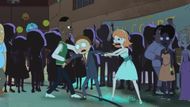
This time directed by Stephen Sandoval and written by Justin Roiland, "Rick Potion No. 9" debuted on Adult Swim on January 27, 2014. In this episode, a botched love potion turns into a virus that spreads across the planet, causing everyone to fall in love with Morty.
Morty asks Rick to use his expertise to transform Jessica into a romantic interest. Obliging Morty, Rick creates a DNA-based love potion for Jessica, but warns him regarding the potential dangers of using it while she has flu symptoms. The potion mutates after Jessica takes it, bringing about unpredictable changes that transform every resident into grotesque "Cronenberg's." The unsuccessful remedy drives Rick to abandon their original home dimension altogether.
Following this, the characters stumble upon an alternate reality, which is constituted by their deceased selves, and with whom they switch bodies. In one chilling scene, Morty buries his dead body and swims over to take the place of his other self in the new family without mentioning anything. Rick dismisses Morty's concerns, stating,
"What about the reality where Hitler cured cancer, Morty? The answer is don't think about it."
The episode highlights how the show illustrates the effects of a person's conduct while demonstrating how its characters effortlessly evade taking blame.
(5) Auto Erotic Assimilation (S2, Ep3)

Written by Ryan Ridley and directed by Bryan Newton, "Auto Erotic Assimilation" shows how Rick used to date a hive-mind named Unity, whom Rick, Morty, and Summer discover. Summer is against Unity's ruling over the inhabitants of a foreign world.
The episode follows the story of how Rick reconnected with Unity, which became a single massive thinking entity that took over an entire planet’s populace. At first, the romantic bond between them appeared exciting and passionate, but eventually, it brought out the more sinister aspects. The ability of Unity to regulate people in exchange for peaceful stability and effective management sparked moral issues because Rick destabilized its control through his unpredictable nature.
When Unity failed to support Rick's mental health, the episode dipped to its lowest point and sent Rick into a deep depression, which turned out to be almost fatal.
Rick's loneliness and mental health issues are the main focus of the plot, making it a dark chapter in Rick and Morty's timeline. His typically exaggerated persona vanishes to reveal the deep emotional void that lies at the heart of his character.
(4) The ABCs of Beth (S3, Ep9)
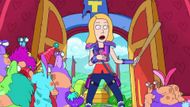
In "The ABCs of Beth," which was written by Mike McMahan and directed by Juan Meza-León, viewers witness Beth and Rick returning to see her childhood buddy Tommy after they visited Froopyland. It is a dream world he had once created to shield her from certain issues. Spending decades trapped in there, Tommy had survived through incest and cannibalism.
While attempting to defend her involvement in Tommy's fate, Beth starts doubting if she has inherited any sociopathic tendencies from Rick. This episode depicts Beth's character development, revealing her hidden rage, dominating personality, and lack of emotional commitment.
Many viewers call this one of the bleakest episodes, as it reveals Beth's emotional detachment, anger issues, and potential sociopathic traits that she may have inherited from Rick. This episode's whimsical setting only heightens the horror of its revelations, making it perhaps the show's most unsettling chapter.
(3) Mortyplicity (S5, Ep2)
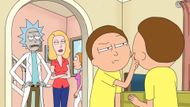
Directed by Lucas Gray and written by Albro Lundy, this episode is also rated TV-14-DLV. According to the synopsis, the Smiths are the target of killer squids, but fortunately, Rick makes a fake family.
In Mortyplicity, viewers watch Rick make false representations of the Smiths to shield them from possible dangers. Rick's decoy method causes unending copy proliferation because his artificial clones begin manufacturing counterfeit duplicates of themselves.
All decoys engage in violent combat to prove their legitimacy through continuous attempts to eliminate one another in this state of disarray. The show investigates three key themes: identity, existence, and the fear of being transformed by others. The dangerous situation they are in is something Rick openly points out while saying:
"Someone's always trying to kill us. That's what the decoys are for. They go on fun, self-contained terrestrial adventures and take bullets meant for us."
With an endless cycle of meaningless violence that instills existential uneasiness in decoys, the plot transforms into a tragi-comic depiction of survival instincts and each character's absence.
(2) That's Amorte (S7, Ep4)
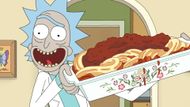
Also directed by Lucas Gray and written by Heather Anne Campbell, this episode aired on Cartoon Network's Adult Swim night program slot on November 5, 2023. In this episode, Morty discovers that the spaghetti dinner that the Smith family is enjoying is created from the remains of people who committed suicide on a different planet. Rick explains,
"On this planet, people that kill themselves turn into spaghetti."
A staunch critique of consumerism and exploitation is established when the world's leaders compel the populace to despair to increase output due to the growing demand for spaghetti manufactured from dead suiciders. Rick expresses his thoughts on the matter by saying:
"Life itself is wrong. And that means death is right. But you can't side with that. So you live. Even when it means eating."
The episode is described as gloomy because it explores moral dilemmas, death, commercialization, and the moral choices made for pleasure.
(1) Fear No Mort (S7, Ep10)

The story in Season 7 Episode 10, "Fear No Mort," shows Rick and Morty experiencing a troubling emotional state when fear seems to lose its impact. The duo enters the strange spatial location known as Fear Hole, which pushes them to confront their latent personal phobias. Morty leaps into full uncertainty, but Rick waits to ponder, causing an emotional schism that kills their relationship.
During the ordeal, Morty uncovers the worst terror of his life through witnessing how effortlessly Rick can step into his role while simultaneously avoiding the plunge. The unexpected meeting of living Diane creates a deeper psychological conflict for Rick in this story.
The episode crescendos as trust fails, demonstrating that family connections can be hard to attain and short-lived. The story challenges characters with two important themes: relational desertion and emotional vulnerability, revealing their emptiness in relationships both within and out. It leaves us stunned.
These seven episodes are notable for their uninhibited exploration of unsettling issues, which go beyond the usual cartoon storytelling. Rick and Morty strikes an ideal balance between the ridiculous and the heartbreaking elements in its dramatic episodes, each of which happens to reveal their characters' innermost psychological difficulties.
Viewers have often expressed their unease while watching several episodes of Rick and Morty. The reason is that these episodes seek to reveal dark corners of one's mind and reality, as is illustrated through Morty's quiet sorrow in "Meeseeks and Destroy" and Rick's emotional numbness in "Fear No Mort."
The show has compelled its viewers to think beyond the jokes and has introduced themes of mental weakness and existential horror encountered while making decisions.
